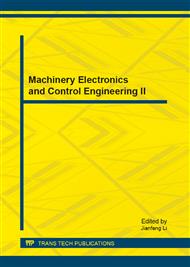p.37
p.41
p.45
p.51
p.55
p.61
p.67
p.72
p.77
The Influence of Moment of Inertia to Induction Motor Rotation in Sensorless Direct Torque Control and Duty Ratio
Abstract:
The vector control has become the first alternative in control of three phase induction motor. One of the vector control method which is commonly used is the direct torque control (DTC) method. However, this system has drawback due to the existence of torque ripples. The addition of the duty ratio control base on fuzzy logic can give better performance compared to conventional DTC. By doing an examination on DTC and duty ratio using small, medium and big capacities of three phase induction motors can be shown the influence from moment of inertia to rotor rotation. This paper uses MATLAB SIMULINK for the simulation study with three types of motor power, for example 1, 10 and 50 hp. It is shown that using the same parameters, a motor with a larger moment inertia gives a better performance in comparison to a motor with smaller moment of inertia.
Info:
Periodical:
Pages:
55-60
Citation:
Online since:
March 2013
Authors:
Price:
Сopyright:
© 2013 Trans Tech Publications Ltd. All Rights Reserved
Share:
Citation:


